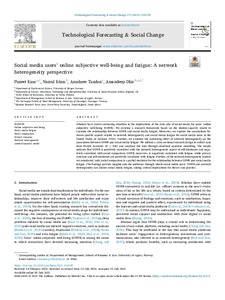| dc.contributor.author | Tandon Anushree | |
| dc.contributor.author | Dhir Amandeep | |
| dc.contributor.author | Kaur Puneet | |
| dc.contributor.author | Islam Nazrul | |
| dc.date.accessioned | 2022-10-28T12:41:49Z | |
| dc.date.available | 2022-10-28T12:41:49Z | |
| dc.identifier.uri | https://www.utupub.fi/handle/10024/161394 | |
| dc.description.abstract | <p> Scholars have drawn increasing attention to the implications of the dark side of social media for users’ online subjective well-being (OSWB). We develop a research framework based on the limited-capacity model to examine the relationship between OSWB and social media fatigue. Moreover, we explore the associations between specific aspects related to network heterogeneity and social media fatigue for social media users in the United States of America (USA). Further, we examine the mediating effect of network heterogeneity on the association between OSWB and social media fatigue. We utilised a cross-sectional research design to collect data from <em>Prolific Academic</em> (<em>N</em> = 320) and analysed the data through structural equation modelling. The results indicate that OSWB is positively correlated with the network heterogeneity aspect of self-disclosure and negatively correlated with social comparison. OSWB, moreover, is negatively correlated with fatigue, while privacy concerns and self-disclosure are positively correlated with fatigue. Further, of the network heterogeneity aspects we considered, only social comparison is a partial mediator for the relationship between OSWB and social media fatigue. The findings provide insights into the pathways through which social media users’ OSWB and network heterogeneity can induce social media fatigue, raising critical implications for theory and practice. <br></p> | |
| dc.language.iso | en | |
| dc.publisher | Elsevier | |
| dc.title | Social media users’ online subjective well-being and fatigue: A network heterogeneity perspective | |
| dc.identifier.urn | URN:NBN:fi-fe2021102752621 | |
| dc.relation.volume | 172 | |
| dc.contributor.organization | fi=tietojärjestelmätiede|en=Information Systems Science | | |
| dc.contributor.organization-code | 2608303 | |
| dc.converis.publication-id | 66531559 | |
| dc.converis.url | https://research.utu.fi/converis/portal/Publication/66531559 | |
| dc.identifier.jour-issn | 0040-1625 | |
| dc.okm.affiliatedauthor | Luukela-Tandon, Anushree | |
| dc.okm.discipline | 3142 Public health care science, environmental and occupational health | en_GB |
| dc.okm.discipline | 113 Computer and information sciences | en_GB |
| dc.okm.discipline | 113 Tietojenkäsittely ja informaatiotieteet | fi_FI |
| dc.okm.discipline | 3142 Kansanterveystiede, ympäristö ja työterveys | fi_FI |
| dc.okm.internationalcopublication | international co-publication | |
| dc.okm.internationality | International publication | |
| dc.okm.type | Journal article | |
| dc.publisher.country | United States | en_GB |
| dc.publisher.country | Yhdysvallat (USA) | fi_FI |
| dc.publisher.country-code | US | |
| dc.relation.doi | 10.1016/j.techfore.2021.121039 | |
| dc.relation.ispartofjournal | Technological Forecasting and Social Change | |
| dc.year.issued | 2021 | |
